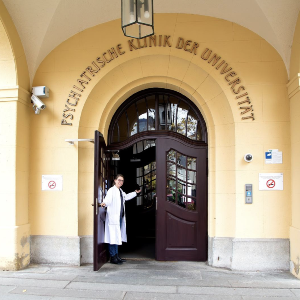120 years of the LMU Clinic for Psychiatry and Psychotherapy
8 Nov 2024
A state-of-the-art clinic with a long tradition celebrates its anniversary with a symposium and an open day
8 Nov 2024
A state-of-the-art clinic with a long tradition celebrates its anniversary with a symposium and an open day

The Clinic for Psychiatry and Psychotherapy at LMU Klinikum is celebrating its 120th anniversary this year. | © LMU Klinikum
Exactly 120 years ago, on November 7, 1904, the Royal Psychiatric Clinic of Ludwig-Maximilians-Universität was opened in the heart of Munich. The clinic quickly advanced to become an internationally important institution, where many famous scientists such as Emil Kraepelin and Alois Alzheimer helped psychiatry to make decisive progress. The tradition of excellent clinical research and caring patient care continues to this day. On November 6 and 7, 2024, the Department of Psychiatry and Psychotherapy will celebrate its 120th anniversary with a high-profile symposium. One day later, interested parties will have the opportunity to take a look behind the scenes of the clinic at Nußbaumstraße 7 at the open day.
When the psychiatric clinic opened in November 1904, psychiatric institutions were still called "lunatic asylums" and psychiatric patients "lunatics", "madmen" or "mentally ill". Nevertheless, psychiatry was in the process of establishing itself as an academic science - and the first Director of the Royal Psychiatric Clinic and Chair of Psychiatry at Ludwig-Maximilians-Universität, the renowned psychiatrist Emil Kraepelin, played a major role in this. For example, the reorganization of psychiatric classifications, which provides for five main groups and which still characterizes the most important international classification systems ICD-10 and DSM-5 today, can be traced back to him.
Discovery of Alzheimer's dementia
Among the assistants who followed Emil Kraepelin to Munich in 1904 was Alois Alzheimer, whom Kraepelin commissioned to set up a brain anatomy laboratory. The laboratory soon became world-famous, as it was here in 1906 that Alzheimer discovered the histological changes in the brain that are characteristic of what is still the most common dementia - and which today bears his name.
Since then, there have been - and still are - numerous other pioneering developments that have led to significant improvements in the medical care of mentally ill patients over the last 120 years. For example, we now have a much better understanding of the various mechanisms and factors that can contribute to the development of a mental illness. In addition, there are now proven standardized definitions and criteria with which mental illnesses can be reliably diagnosed in most cases.
Wide range of therapies
"Above all, however, we now have a wide range of therapies that include both somatic treatment methods such as medication and psychotherapeutic measures," says Professor Dr. Peter Falkai, who has been Director of the Department of Psychiatry and Psychotherapy at LMU University Hospital for twelve years. A combination of therapies is often used, such as a psychotropic drug in combination with talk therapy. "Thanks to these and many other achievements of research in the field of psychiatry, we can now provide individual assistance to those affected and support them very effectively in regaining their ability to function and quality of life," emphasizes the Deputy Director of the Clinic and Head of the Department of Clinical Neuropsychology, Professor Dr. Oliver Pogarell.
The psychiatric nursing service at the Psychiatric Clinic of the LMU Hospital works closely with psychiatrists, psychologists, social pedagogues, physiotherapists, occupational therapists, art and music therapists on 14 wards. 218 beds are available for full inpatient care, while the day clinic for the day-care setting has 24 therapy places. There are also special outpatient clinics for various clinical pictures, such as the bipolar, addiction or autism outpatient clinic.
Basic research for further progress
To this day, the Psychiatric Clinic is one of the leading research institutions. And it continues to pursue the goal of advancing psychiatry through basic research and clinical studies, thus opening up new diagnostic and treatment options for patients. "We offer research opportunities for all disease groups: from addictions, affective and psychotic disorders to personality disorders and dementia," explains Professor Falkai. Other key areas of research include methods of brain stimulation, the development of special psychotherapy programs and the early detection of mental illnesses using modern imaging techniques. "Our clinic has a wealth of research methods available for this, such as state-of-the-art in-house imaging and our own biobank," says Professor Pogarell.
To mark its 120th anniversary, the Clinic for Psychiatry and Psychotherapy is hosting a two-day specialist symposium on Wednesday, 6 November and Thursday, 7 November in the lecture theatre at Nußbaumstraße 7.
The open day for the general public will take place on Friday, 8 November: From 10 a.m. to 3 p.m., anyone who would like to find out more about the work and opportunities in psychiatry will have the opportunity to immerse themselves in a colourful supporting programme at Nußbaumstraße 7. In addition to information stands and discussions with experts from the psychiatric clinic, the programme also includes guided tours where visitors can take a look inside the clinic, for example in the Centre for Non-Invasive Brain Stimulation, the day clinic or the St. Vincent House. Interested parties can also find out about the various forms of treatment and have the opportunity to experience therapies first-hand. The interactive hands-on programme offers taster sessions on self-care, art therapy, occupational therapy and wellbeing therapy, among other things.
‘This anniversary offers us a unique opportunity to look back on developments in psychiatry and psychotherapy and look to the future together,’ says Professor Falkai.